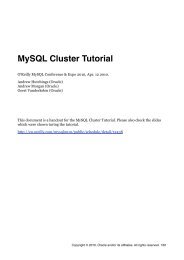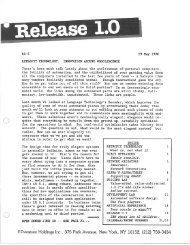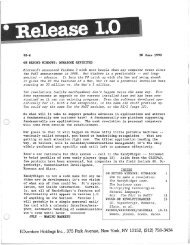Programming Grails - Cdn.oreilly.com
Programming Grails - Cdn.oreilly.com
Programming Grails - Cdn.oreilly.com
You also want an ePaper? Increase the reach of your titles
YUMPU automatically turns print PDFs into web optimized ePapers that Google loves.
Using a StringBuilder (the preferred approach when concatenating in a loop) wouldn’t<br />
be much better in this case. But using a GString (along with property syntax), we can<br />
join the data in a single line of code:<br />
def fullName = "$person.firstName ${person.initial ? person.initial + ' '<br />
: ''}$person.lastName"<br />
GStrings also work with multiline strings as long as you use three double quotes; this<br />
is convenient for tasks such as filling in templates for emails:<br />
def template = """\<br />
Dear $name,<br />
Thanks for signing up for the Ralph's Bait and Tackle online store!<br />
We appreciate your business and look forward to blah blah blah …<br />
Ralph<br />
"""<br />
Here, I’m using the backslash character at the beginning of the string to avoid having<br />
an initial blank line. You can use three single quotes to create multiline strings, but they<br />
behave like regular strings that use single quotes, in that they do not support expression<br />
replacement.<br />
Using the subscript operator lets you conveniently access substrings:<br />
String str = 'Groovy Strings are groovy'<br />
assert str[4] == 'v' // a String of length 1, not a char<br />
assert str[0..5] == 'Groovy' // the first 6 chars<br />
assert str[19..-1] == 'groovy' // the last 6 chars<br />
assert str[15..17] == 'are' // a substring in the middle<br />
assert str[17..15] == 'era' // a substring in the middle, reversed<br />
Static this<br />
Unlike Java where the this keyword only makes sense in instance scope, this resolves<br />
to the class in static scope. One use of this feature is when defining static loggers. In<br />
Log4j and SLF4J, you can define a logger with a class or the class name (or any string<br />
you like), but in Java, there’s no way (no convenient one anyway) to get the class name<br />
in static scope. This can lead to copy/paste problems. For example:<br />
private static final Logger LOG = Logger.getLogger(Foo.class);<br />
has the class hardcoded, so if you forget to change it and copy that to a different class,<br />
you’ll be logging as the wrong category. Instead, in Groovy, you can use:<br />
private static final Logger LOG = Logger.getLogger(this)<br />
which is more portable (and similar to the analogous instance version private final<br />
Logger log = Logger.getLogger(getClass())).<br />
20 | Chapter 1: Introduction to Groovy

















